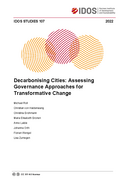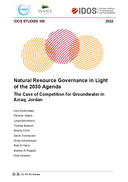Large scientific studies and advice reports as well as the reports of the research teams of the Postgraduate Programme run by the German Institute of Development and Sustainability (IDOS) are being published as “Studies”. The series focuses on regional and thematic issues and always has empirical references. Studies can be downloaded for free from the IDOS website.
You can also order a hard copy for 10 € by contacting our publication department by e-mail or mail.
This only applies to the former DIE studies in book format. The new IDOS Studies series is online only.


